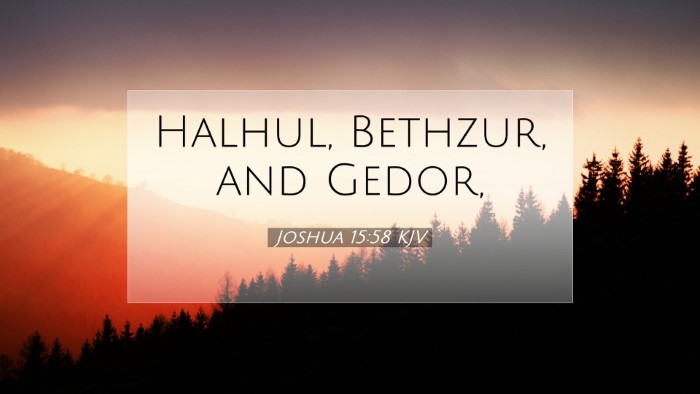Commentary on Joshua 15:58
Joshua 15:58 states: "And Keda, and Azeh, and Juttah, and their cities, and all the villages that were around these cities." This verse is part of the allocation of land by Joshua to the tribes of Israel, specifically focusing on the cities and villages in the territory of Judah. Below is a compilational examination of this scripture through the lens of respected public domain commentaries.
Contextual Overview
This passage falls within a larger narrative where the allocation of land is being systematically detailed. The tribes of Israel, having conquered the Promised Land, are being apportioned specific territories, which is critical for understanding their identity and heritage as a nation. The mention of cities like Keda, Azeh, and Juttah emphasizes the methodical governance of land distribution.
Examination of Key Terms
- Keda: A city that signifies those who may be 'protected'. Its listing here signifies its importance in the tribal structure of Judah.
- Azeh: Its meaning points to a place that may convey fortitude or stronghold, underlining the providence of God in the granting of these cities.
- Juttah: This city may also indicate a place of gathering or sanctification, pointing to the communal approach of worship and maintenance of their covenant with God.
Theological Insights
From Matthew Henry's commentary, we learn that the distribution of cities among the tribes served not only to establish physical dominion but also to reflect the spiritual standing of each tribe as they settled into their inheritance. The cities mentioned in Joshua 15:58 illustrate the blessings of God as they receive their promised land, revealing His faithfulness and the fulfillment of covenant promises.
The Nature of God's Promises
Henry asserts that God's promises are reliable and certain, and the division of land serves as a confirmation of His steadfastness. Each of these cities is a testament to God's provision and an invitation to dwell in His grace.
Pastoral Reflections
Albert Barnes provides a practical application of this passage by emphasizing God's involvement in the details of life. The act of naming cities and recognizing their importance reflects God's care for the individual as well as the community. This serves as a reminder to pastors and leaders to be mindful of the unique contributions of their congregations.
Community and Identity
Adam Clarke notes that the listing of cities is more than geographical; it is deeply interwoven with the identity of the tribe of Judah. Each city becomes a place where the people can gather, worship, and maintain their traditions. It is through these cities that the memory of God's deliverance is preserved and passed down through generations. The significance of names and places reminds us that community is essential to our faith journey.
Covenantal Relationship
As Clarke elaborates, the covenantal relationship established through these land grants speaks to the larger theme of God's relationship with His people. Each city represents a checkpoint in the unfolding of salvation history, encapsulating the essence of belonging and stewardship of God's gifts.
Conclusion
In summary, Joshua 15:58 serves as a microcosm of wider theological truths about God's faithfulness, the importance of community, and the notion of heritage within faith practice. The cities of Keda, Azeh, and Juttah are not merely geographical locations; they embody the life, culture, and spiritual identity granted to the people of Israel. This understanding holds profound significance for pastors, theologians, and students alike, invoking timely reflections on God's presence in community building and land stewardship in contemporary faith contexts.


